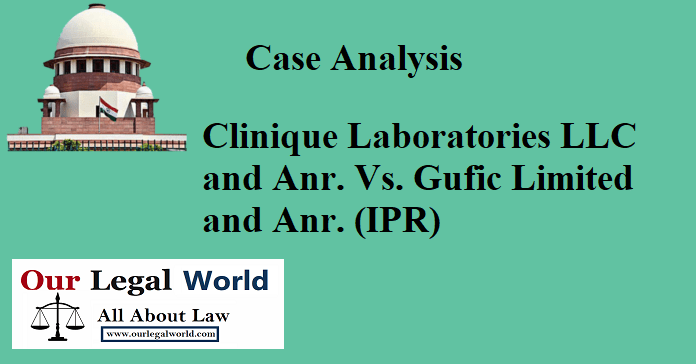Clinique Laboratories LLC and Anr. Vs. Gufic Limited and Anr. MANU/DE/0797/2009: IPR (Trademark): Case Analysis
Case Name: Clinique Laboratories LLC and Anr. Vs. Gufic Limited and Anr Court:Supreme Court of India Year: 2009 Citation: Civil Appeal No. 4109 of 2009
Introduction
Whenever someone thinks of start up, the first thing that comes to the mind is the product or service of the start up. One gives a lot of herdwork working on that product and in order to give it a distinct identity trademark is made for the same so that the public can identitfy the product easily. Trademark helps the company to reach higher levels of business and become a known brand among the people. Now if the other company comes up with a similar trademark, brand name or logo, it can take away the customers of the first business and may bring losses to the company which is deceptive for the public and not justifiable for the company. This is a illegal and common practise in the market which is generally looked upon.
Therefore in order to prevent the unauthorised use of logo brand or trademark, the trademark act comes into play. Also the status and development of trademark and other IPR laws acts as a driving force for the foreign investors and companies to invest in the country’s local market.
The suit has to be instituted within 3 years from the time of gaining knowledge of the infringement of the trademark. The act provides with several remedies and reliefs to the aggrieved under section 135 which provides
- damages or an account of profits together;
- delivery of infringing labels or marks for destruction;
- Injunction- ex parte or interlocutory injunction for discovering documents, preserving the infringed goods or restraining the defendant from disposing of his assets in a manner which would adversely affect the plaintiff in recovering damages from the defendant
Facts
The plaintiff (Clinique Laboratories) has the registered trademark by the name ‘CLINIQUE’ since 13th July,1981 in regards to cosmetics, lotions, oils and creams, used in cleansing etc, falling under class 3 of the goods and services mentioned in the 4th schedule to the Trade Marks Rules, 2002. There are many other trademarks that are owned by the plaintiff and most of them include the word ‘CLINIQUE’. For the plaintiff’s products which are used worldwide, Clinique is the most distinguished feature of the trademark and the plaintiff’s company has been doing business in India since 2007
The respondent has been selling their product “STRETCH NIL SKINCLINIQ” since 1999, defendant has their registered trademark by the name ‘CLINIQ’ but the plaintiff got to know about the registration and usage of mark “SKINCLINIQ” and use of the label ‘SKINCLINIQ STRETCH NIL’ on or about September, 2006. Defendants were involved in the same business as that of plaintiff and both the parties got their trademark registered with the registrar of trademark authority.
On discovering about the similar trademark that defendant got, the plaintiff filed a rectification application (cancellation petition) with the Registrar of Trademarks, India with a view to get the trademark of the defendant cancelled. At the same time the plaintiff also files a suit in the court seeking the order of injunction against the defendant prohibiting them from passing off the goods manufactured under the similar trademark and selling them in the Indian market not even through their distributor and agents.
Issues
- Whether there is an infringement of the trademark by the defendant.
- Whether a suit be brought up against a registered trademark for infringement of another registered trademark.
- Whether the court can pass interim injunction to restrain the use of registered trademark.
Order
In this landmark case the court said that a proprietor of a registered trademark is legally capable of bringing a suit against another proprietor of the registered trademark if the trademark is identical or similar in any kind and infringes the right of the trademark owner.
Also Read: Legal Maxims related to the Law of Torts
According to the section 124(1)(ii) of the Indian Trade Marks Act, 1999, until the cancellation petition is not finally decided by the competent authorities the suit is liable to be stayed till then.
However the court is competent to pas interlocutory orders in between like interim injunction, appointment of receiver attachment of property and keeping of accounts, etc under section 124(5) of the same.
In this case, on 09.09.2009, the hon’ble court passed an order of interim injunction against the defendant until the rectification application is not finally decided by the Registrar of the Trademark and further restricting them to manufacture or sell the products in the market either directly or through their distributors and agents.
Order of the Appellate court
After this order when the defendant went to the appeal in the Delhi High Court for vacating the ex-parte order of the lower court, the single judge upheld the decision of the lower court stating that the test of infringement laid down in section 29 of the trademark act was completely satisfied as it is prima facie that the trademark was invalidly registered and consequently the defendant has been using the similar trademark illegally.
The High Court also stated that the similarity in the trademark ‘CLINIQUE’ and ‘CLINIQ’ looks a deliberate attempt on part of the defendant to benefit from the petitioner’s trademark and was done to just showcase some relation or association between the products.
Also the printing of the words like “Made in India by Gufic Bio Science Ltd” on the products suggests the idea to public that the gufic is manufacturing these products under the licence from the petitioner. The court also observed that the word “SKINCLINIQ” was used in much smaller font than the rest of the name of the product so even if the court restricts the defendant from using the trademark the defendant would not suffer much loss from this order.
Conclusion
To conclude my case study I would like to say that “The fruit of one’s labour shall not be enjoyed by another” meaning thereby the proprietor having the registered trademark has all the exclusive rights regarding the products or services of the trademark registered. The infringing trademark if is deceptive and identical to the previously registered trademark, then it will be liable for infringement of the previously registered trademark.
Entrepreneurs should be well aware in present times as trademark and its goodwill is the most important part of the identity of the company and therefore in my opinion should get their trademarks registered as the Act provides heavy protection against infringement.




![Call for Campus Ambassadors by Our Legal World [2 Months; Virtual]: Apply by June 15](https://www.ourlegalworld.com/wp-content/uploads/2024/06/Logo-New-136x150.png)


